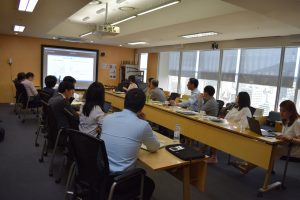 Seoul, June 21 – The Global Green Growth Institute (GGGI) in partnership with the Institute for Global Environmental Strategies (IGES) co-organized a pre-technical meeting on the ‘China-Japan-Korea (CJK) Green Growth Collaboration Program on Low Carbon Cities’ at the GGGI Seoul headquarters on June 20-21.
Seoul, June 21 – The Global Green Growth Institute (GGGI) in partnership with the Institute for Global Environmental Strategies (IGES) co-organized a pre-technical meeting on the ‘China-Japan-Korea (CJK) Green Growth Collaboration Program on Low Carbon Cities’ at the GGGI Seoul headquarters on June 20-21.
Technical experts from four execution agencies – designated by the governments of China, Japan and the Republic of Korea – namely the National Center for Climate Change Strategy and International Cooperation (NCSC), IGES, the Korea Environment Institute (KEI) and the Green Technology Center participated in the workshop to discuss the technical components of conducting a joint research project and coming up with strategic objectives of trilateral cooperation.
Co-facilitated by Dr. Junichi Fujino of IGES and Dr. Chanho Park of GGGI, the first day of the meeting centered around sharing low-carbon pilot cities and advanced urban development practice cases from each country. Through an enhanced understanding of the context, participants engaged in interactive discussions to exchange views on the selection criteria of cities to be included in this joint research, time frame and the next steps.
This two-day meeting served as one of the key building blocks to move forward with ideas for the joint collaborative work to deliver impact in each country and ultimately, extend the impact to regions to promote low-carbon city development. This trilateral cooperation officially commenced at the 22nd Conference of the Parties to the UNFCCC (COP 22), followed by a technical side event in COP23 where sustainable cities were identified as the first key thematic area for this joint initiative.
The next meeting will tentatively take place in Beijing in October 2018. Going forward, GGGI will continue to provide collaborative efforts for the three countries to address the importance of a low-carbon and sustainable future.